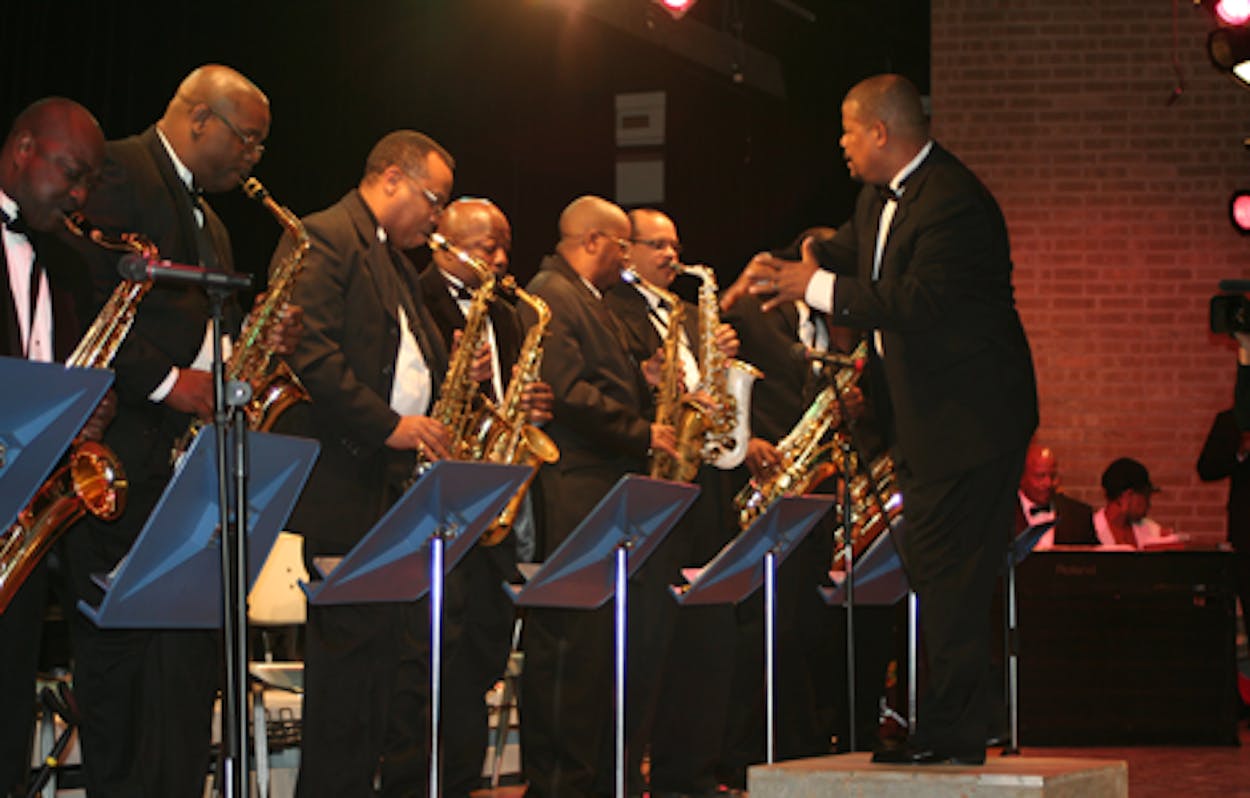The new documentary Thunder Soul tells a story that in its contours, may seem familiar to most moviegoers. On one level, it’s an “inspirational teacher” tale, a real-life Stand and Deliver or Mr. Holland’s Opus, about Conrad “Prof” Johnson, a teacher who, in the late 1960s, formed a school stage band at Kashmere High School in Houston. The band garnered international acclaim and transformed the lives of many of its young performers.
But the film, directed by Mark Landsman, is also a portrait of both the cruelties and unexpected graces of time, much like Michael Apted’s famed Up documentary series, which has chronicled the lives of a group of young British students at seven-year intervals.
Landsman’s story centers on the 2008 reunion of the Kashmere Stage Band for a pair of tribute concerts honoring the then 92-year-old Johnson. Landsman followed the preparations for these concerts, and his film movingly juxtaposes images of the band members in their youth with scenes of them in the present day, grayer, heavier and struggling to blow the trumpet with as much gusto as they once did.
Yet what makes Thunder Soul resonate most powerfully is its urgent, underlying message about the value of arts education. The film, which opened in select cities in September and is expanding nationwide throughout October, arrives just a few months after the Texas Legislature passed a budget that slashed $4 billion in financing from public schools. In such lean economic times, money for arts programs—which allowed scores of young students at Kashmere in the late 1960s and 70s to flourish—is viewed as dispensable.
“It amazes me where our priorities are at in terms of the arts in public education,” said Landsman in an online interview. At his own high school in suburban Chicago, Landsman said, “We had a dark room. We had a film program. We had extraordinary resources at our fingertips largely because we were in a school district with good support.”
The filmmaker, who has served in artist-in-residence programs at a number of schools and once taught in New York City, added: “That’s when I was shocked. Those public schools had to fight tooth and nail for things I took for granted.”
The story of the Kashmere High School stage band wasn’t necessarily a forgotten one. Throughout the 1970s, the band regularly competed in regional and national music tournaments. In 1972, the all-black group won the All-American High School Stage Band Festival in Mobile, Alabama, during the tenure of George Wallace, the state’s segregationist governor.
More recently, in 2006, Now-Again Records issued Texas Thunder Soul 1968-1974, a compilation of the band’s recordings made by Johnson, who died in 2008, just a day after the second of the Kashmere reunion concerts. Landsman said he got the idea for Thunder Soul after hearing an NPR report on the group that same year.
The film nonetheless manages to capture a fresh aspect of the Kashmere Stage Band story: the lifelong effects the experience had on its members. Craig Baldwin, one of the documentary’s main subjects, served as the music director for the 2008 reunion concerts and poignantly confesses in the film that he was drifting toward a life of crime before joining the band. Another member, Gerald Calhoun, cultivated a professional music career, writing for the 1980s singer Pebbles and performing in Europe.
“I put all my focus and attention on getting into that band,” Calhoun recalled in a recent interview. “I was really small, and the bass guitar was basically like my voice, where I could be seen and heard.”
The film is being “presented” by Jamie Foxx (who also has an executive producer credit). Foxx has said it mirrored his own experiences with inspiring music teachers as a student in Terrell. Thunder Soul premiered at the 2010 South by Southwest Film Festival, where it won an audience award. The film was also nominated last year for an Independent Spirit Award. (It is not eligible for this year’s Oscar race: according to a representative for the film’s United States distributor, Roadside Attractions, having had an Oscar-qualifying run in 2010 though it not nominated.)
As for the film’s real-world impact, Paul A. Hardin, who took over as principal at Kashmere High School in July 2010, said Thunder Soul has been “a serious shot in the arm” for a school that in recent years has struggled with low enrollment and a poor public image.
However, the school cannot escape financial realities. The recently passed state budget—which reduced funding to the Houston Independent School District for the 2011–12 school year by more than $77 million—forced Hardin to eliminate the school’s choir program. (The school’s jazz band, which is the modern-day iteration of the 1970s-era stage band, continues to be financed and regularly performs with the alumni group, the Kashmere Reunion Stage Band.)
Hardin said he was trying to find a way to reinstate the choir program and other axed electives, and that he hoped Kashmere would be able to build on the momentum created by Thunder Soul. He said the great lesson of the film, which was screened for students in September, is that it shows the children what a previous generation achieved at their oft-maligned school.
“Working on the good life, that’s been our theme,” he said. “Not just dreaming of the good life, but actually working on it. That really came alive to the kids when they saw the movie.”







